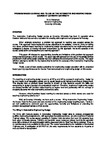Problem Based Learning and its use on the Automotive Engineering Design Course at Coventry University
| dc.contributor.author | Robotham, AJ | |
| dc.contributor.editor | Gilchrist I | |
| dc.date.accessioned | 2015-04-08T12:56:22Z | |
| dc.date.available | 2015-04-08T12:56:22Z | |
| dc.date.issued | 1998 | |
| dc.identifier.uri | http://hdl.handle.net/10026.1/3295 | |
| dc.description.abstract |
The Automotive Engineering Design course at Coventry University has been in operation since October 1989 and has earned a reputation for creating able engineers well prepared for industry. When originally conceived, a problem led approach to learning was adopted across the course. This approach best enables the course objectives to be satisfied. However, there is nothing new about problem-based learning for engineering design educators but for our engineering science colleagues a degree of novelty has been encountered by this approach. But is the success of the course purely down to this teaching and learning approach? This paper will discuss the opportunities, benefits and limitations of the problem-led approach being extended across a whole course. The paper also will address how the use of industrially defined problems in engineering design projects has been critical to the development of the course. The paper will then attempt to identify the key factors that lie behind the success of the Automotive Engineering Design course. Finally, a set of best practice guidelines for engineering design education will be presented based upon my experiences as the Course Tutor and a teacher of engineering design on this course. | |
| dc.language.iso | en | |
| dc.title | Problem Based Learning and its use on the Automotive Engineering Design Course at Coventry University | |
| dc.type | conference | |
| plymouth.date-start | 1998-06-30 | |
| plymouth.date-finish | 1998-07-01 | |
| plymouth.conference-name | SEED98: Engineering Design Education Conference ‘98 Design at the Interface | |
| plymouth.publication-status | Published | |
| plymouth.organisational-group | /Plymouth | |
| plymouth.organisational-group | /Plymouth/Faculty of Science and Engineering | |
| plymouth.organisational-group | /Plymouth/REF 2021 Researchers by UoA | |
| plymouth.organisational-group | /Plymouth/REF 2021 Researchers by UoA/UoA12 Engineering | |
| plymouth.organisational-group | /Plymouth/Users by role | |
| plymouth.organisational-group | /Plymouth/Users by role/Academics | |
| dc.publisher.place | Imperial College of Science Technology and Medicine, University of London, London, UK | |
| dc.rights.embargoperiod | Not known | |
| rioxxterms.licenseref.uri | http://www.rioxx.net/licenses/all-rights-reserved | |
| rioxxterms.type | Conference Paper/Proceeding/Abstract |


